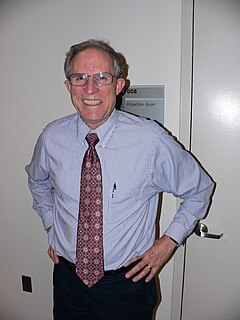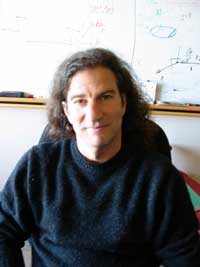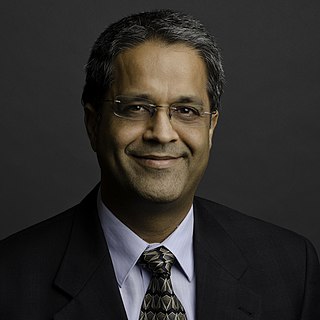Related Research Articles
The Association for Computing Machinery (ACM) is a US-based international learned society for computing. It was founded in 1947 and is the world's largest scientific and educational computing society. The ACM is a non-profit professional membership group, claiming nearly 110,000 student and professional members as of 2022. Its headquarters are in New York City.

David Harold Bailey is a mathematician and computer scientist. He received his B.S. in mathematics from Brigham Young University in 1972 and his Ph.D. in mathematics from Stanford University in 1976. He worked for 14 years as a computer scientist at NASA Ames Research Center, and then from 1998 to 2013 as a Senior Scientist at the Lawrence Berkeley National Laboratory. He is now retired from the Berkeley Lab, but continues as a Research Associate at the University of California, Davis, Department of Computer Science.

Jack Joseph Dongarra is an American computer scientist and mathematician. He is the American University Distinguished Professor of Computer Science in the Electrical Engineering and Computer Science Department at the University of Tennessee. He holds the position of a Distinguished Research Staff member in the Computer Science and Mathematics Division at Oak Ridge National Laboratory, Turing Fellowship in the School of Mathematics at the University of Manchester, and is an adjunct professor in the Computer Science Department at Rice University. He served as a faculty fellow at the Texas A&M University Institute for Advanced Study (2014–2018). Dongarra is the founding director of the Innovative Computing Laboratory at the University of Tennessee.
Allan Bertram Borodin is a Canadian-American computer scientist who is a professor at the University of Toronto.

James Albert Sethian is a professor of mathematics at the University of California, Berkeley and the head of the Mathematics Group at the United States Department of Energy's Lawrence Berkeley National Laboratory.
Edward Seidel is an American academic administrator and scientist serving as the president of the University of Wyoming since July 1, 2020. He previously served as the Vice President for Economic Development and Innovation for the University of Illinois System, as well as a Founder Professor in the Department of Physics and a professor in the Department of Astronomy at the University of Illinois at Urbana-Champaign. He was the director of the National Center for Supercomputing Applications at Illinois from 2014 to 2017.
Charles Samuel Peskin is an American mathematician known for his work in the mathematical modeling of blood flow in the heart. Such calculations are useful in the design of artificial heart valves. From this work has emerged an original computational method for fluid-structure interaction that is now called the “immersed boundary method". The immersed boundary method allows the coupling between deformable immersed structures and fluid flows to be handled in a computationally tractable way. With his students and colleagues, Peskin also has worked on mathematical models of such systems as the inner ear, arterial pulse, blood clotting, congenital heart disease, light adaptation in the retina, control of ovulation number, control of plasmid replication, molecular dynamics, and molecular motors.
David E. Keyes is a Senior Associate to the President of King Abdullah University of Science and Technology (KAUST) and the Director of the Extreme Computing Center at King Abdullah University of Science and Technology (KAUST). He was the inaugural Dean of the Division of Computer, Electrical, and Mathematical Sciences and Engineering (CEMSE) at KAUST and remains an adjunct professor in Applied Physics and Applied Mathematics at Columbia University and an affiliate of several laboratories of the U.S. Department of Energy. With backgrounds in engineering, applied mathematics, and computer science, he works at the algorithmic interface between parallel computing and the numerical analysis of partial differential equations, across a spectrum of aerodynamic, geophysical, and chemically reacting flows.
Margaret H. Wright is an American computer scientist and mathematician.

William Douglas Gropp is the director of the National Center for Supercomputing Applications (NCSA) and the Thomas M. Siebel Chair in the Department of Computer Science at the University of Illinois at Urbana–Champaign. He is also the founding Director of the Parallel Computing Institute. Gropp helped to create the Message Passing Interface, also known as MPI, and the Portable, Extensible Toolkit for Scientific Computation, also known as PETSc.
Chi-Wang Shu is the Theodore B. Stowell University Professor of Applied Mathematics at Brown University. He is known for his research in the fields of computational fluid dynamics, numerical solutions of conservation laws and Hamilton–Jacobi type equations. Shu has been listed as an ISI Highly Cited Author in Mathematics by the ISI Web of Knowledge.

Phillip Colella is an American applied mathematician and a member of the Applied Numerical Algorithms Group at the Lawrence Berkeley National Laboratory. He has also worked at Lawrence Livermore National Laboratory. He is known for his fundamental contributions in the development of mathematical methods and numerical tools used to solve partial differential equations, including high-resolution and adaptive mesh refinement schemes. Colella is a member of the US National Academy of Sciences.

Constantinos Daskalakis is a Greek theoretical computer scientist. He is a professor at MIT's Electrical Engineering and Computer Science department and a member of the MIT Computer Science and Artificial Intelligence Laboratory. He was awarded the Rolf Nevanlinna Prize and the Grace Murray Hopper Award in 2018.
The Sidney Fernbach Award established in 1992 by the IEEE Computer Society, in memory of Sidney Fernbach, one of the pioneers in the development and application of high performance computers for the solution of large computational problems as the Division Chief for the Computation Division at Lawrence Livermore Laboratory from the late 1950s through the 1970s. A certificate and $2,000 are awarded for outstanding contributions in the application of high performance computers using innovative approaches. The nomination deadline is 1 July each year.

James Weldon Demmel Jr. is an American mathematician and computer scientist, the Dr. Richard Carl Dehmel Distinguished Professor of Mathematics and Computer Science at the University of California, Berkeley.

Alan Stuart Edelman is an American mathematician and computer scientist. He is a professor of applied mathematics at the Massachusetts Institute of Technology (MIT) and a Principal Investigator at the MIT Computer Science and Artificial Intelligence Laboratory (CSAIL) where he leads a group in applied computing. In 2004 he founded a business, Interactive Supercomputing, which was later acquired by Microsoft. Edelman is a fellow of American Mathematical Society (AMS), Society for Industrial and Applied Mathematics (SIAM), Institute of Electrical and Electronics Engineers (IEEE), and Association for Computing Machinery (ACM), for his contributions in numerical linear algebra, computational science, parallel computing, and random matrix theory, and he is one of the cocreators of the technical programming language Julia.
Marsha J. Berger is an American computer scientist. Her areas of research include numerical analysis, computational fluid dynamics, and high-performance parallel computing. She is a Silver Professor of Computer Science and Mathematics in the Courant Institute of Mathematical Sciences of New York University.
Ann S. Almgren is an American applied mathematician who works as a senior scientist and group leader of the Center for Computational Sciences and Engineering at the Lawrence Berkeley National Laboratory. Her primary research interests are in computational algorithms for solving PDE's for fluid dynamics in a variety of application areas. Her current projects include the development and implementation of new multiphysics algorithms in high-resolution adaptive mesh codes that are designed for the latest multicore architectures.

Inderjit S. Dhillon is the Gottesman Family Centennial Professor of Computer Science and Mathematics at the University of Texas at Austin, where he is also the Director of the ICES Center for Big Data Analytics. His main research interests are in machine learning, data analysis, parallel computing, network analysis, linear algebra and optimization.
Edmond Chow is an associate professor in the School of Computational Science and Engineering of Georgia Institute of Technology. His main areas of research are in designing numerical methods for high-performance computing and applying these methods to solve large-scale scientific computing problems.
References
- ↑ "CAMCOS" . Retrieved 2011-03-08.
- ↑ "2018 The Berkeley Lab Prize – Lifetime Achievement Award: John Bell". LBNL. 2018-08-09. Retrieved 2018-08-09.
- ↑ "SIAM Fellows: Class of 2009". SIAM . Retrieved 2011-03-08.
- ↑ "Sidney Fernbach Award". IEEE Computer Society. Archived from the original on 2010-12-30. Retrieved 2011-03-11.
- ↑ "Berkeley Lab's John Bell Receives 2005 Sidney Fernbach Award for Outstanding Contributions to High Performance Computing". Berkeley Lab Computing Sciences. 2005-11-07. Archived from the original on 2010-07-25. Retrieved 2011-03-08.
- ↑ "LBNL Researchers Bell and Colella Receive First SIAM/ACM Prize in CSE". SIAM. 2003-09-30. Retrieved 2011-03-08.